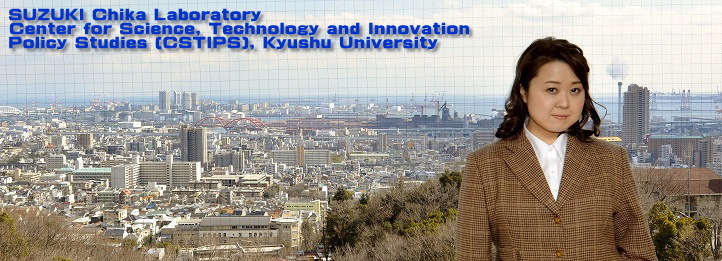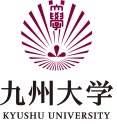

These are the contact details of the SUZUKI Chika Laboratory, Center for
Science, Technology and Innovation Policy Studies (CSTIPS), Kyushu University
“We aim to investigate the mysteries of marine biology through various academic methods.”
I am an environmental scientist working in the area of agriculture (fisheries science). As a (somewhat eccentric) child, I had an extraordinary desise for university: I competed regularly for the Japan Student Science Award, transformed a spare room in my house into my own laboratory, and once performed a rather naughty experiment involving a professor at the local national university.

When I began my university education, I first studied agriculture (fisheries science), which profoundly shaped who I am today. I entered the laboratory when I was a first-year student and learned the basics of fish pathology. I also learned the basics of GIS and mathematical statistics in my university training both in Japan and overseas. Through these experiences, I developed the belief that knowledge of mathematical statistics is necessary for a more in-depth study of biology, and I decided to advance my knowledge in this area by enrolling in a master’s course in the field of physics (mathematics). Although the course material was still related to marine organisms (red tides), it reminded me of the days when I was enthusiastic to ask, “How can I identify regularities from massive data?” In my doctoral studies, I acquired knowledge in two specializations: physics (mathematics) and sociology (environmental policy). Furthermore, I was fortunate to receive the support of the 21st Century COE Program (a humanities and sciences integration program), affording me the opportunity to learn physics (geoscience) not as a student but as a researcher. In my work as a university teacher since completing a post-doctoral fellowship with the Japan Society for the Promotion of Science, I have been involved in a variety of fields and institutions, including Kochi University (fisheries oceanography), Aichi Medical Association, and Kobe University (engineering). It has been stated, “Environmental science is the discipline that includes all the fields.” Although my work is still primarily focused on agriculture (fisheries science), the same tools that are used to “reveal the mysteries of biological phenomena in the ocean” and “realize better research results” are also found in many different disciplines.
Incidentally, the department in which I obtained my PhD does not evaluate on the basis of the impact factor of academic journals in which they publish original, co-authored papers, but rather evaluates whether “the person is capable of writing original papers as a single author (by his or her own ability).”Even among teachers, not so many hold doctoral degrees, and many of my peers with doctorates are unemployed. I had to seek minimum research funding on my own and study by myself in order to obtain a degree. I therefore think it is important for researchers to acquire more“tools,”beyond those that are standard in the field studied. A broader set of tools may also improve a researcher’s confidence. I am also still working to broaden my knowledge and skills in the engineering field. The basic principle of the experimental system is that the equipment, chemicals and support research are personnel are all prepared by the a initiator.
Incidentally, the department in which I obtained my PhD does not evaluate on the basis of the impact factor of academic journals in which they publish original, co-authored papers, but rather evaluates whether “the person is capable of writing original papers as a single author (by his or her own ability).”Even among teachers, not so many hold doctoral degrees, and many of my peers with doctorates are unemployed. I had to seek minimum research funding on my own and study by myself in order to obtain a degree. I therefore think it is important for researchers to acquire more“tools,”beyond those that are standard in the field studied. A broader set of tools may also improve a researcher’s confidence. I am also still working to broaden my knowledge and skills in the engineering field. The basic principle of the experimental system is that the equipment, chemicals and support research are personnel are all prepared by the a initiator.
(Studies currently in progress)
●Marine Mathematical Statistics: Analysis of environmental change in the areas under Water Pollutant Control Law
●Marine Bioresource Sciences: Extraction and the use of algal photosynthesis pigment
●Marine Policy: Appropriate use of the Water Pollutant Control Law and maintenance of the Satoumi
●Marine Education: The use of a mechanized creature and education using a simple differential volumeter-productmeter
(Other possible studies, to guide students)
●Marine GIS: Measurement of the space scale and itsrelation to seaweed beds and red tides
●Marine Civil Engineering: Making seaweed beds (particularly, the impact of sea creatures and prevention of seawater impairment)
●Fish Pathology: Histologic distinction between cultured fish and wild fish
●Marine Environmental Studies: Marine studies and analysis of the seas near Japan and eutrophicated inner bays.
●Marine Mathematical Statistics: Analysis of environmental change in the areas under Water Pollutant Control Law
●Marine Bioresource Sciences: Extraction and the use of algal photosynthesis pigment
●Marine Policy: Appropriate use of the Water Pollutant Control Law and maintenance of the Satoumi
●Marine Education: The use of a mechanized creature and education using a simple differential volumeter-productmeter
(Other possible studies, to guide students)
●Marine GIS: Measurement of the space scale and itsrelation to seaweed beds and red tides
●Marine Civil Engineering: Making seaweed beds (particularly, the impact of sea creatures and prevention of seawater impairment)
●Fish Pathology: Histologic distinction between cultured fish and wild fish
●Marine Environmental Studies: Marine studies and analysis of the seas near Japan and eutrophicated inner bays.

2018.12.25 Paper (JHES, Multiple author)
was published.
was published.
2015.3.31 Book published.(English, Sole author)
2014.11 My research activities were mentioned in the latest
book (新々一歩いっぽ四) by Mr. Toshizo Ido,Governor of
Hyogo Prefecture (pages 113 to 121, total of 241 pages).

Please use the following e-mail address
for any inquiries about the SUZUKI Chika
Laboratory:
suzuki#sti.kyushu-u.ac.jpfor any inquiries about the SUZUKI Chika
Laboratory:
(To send please convert # to @.)
Address:
744 Motooka, Nishi-ku, Fukuoka City, Fukuoka Prefecture 819-0395
Suzuki Chika Laboratory (3F 330)
Center for Science, Technology and Innovation Policy Studies (CSTIPS), Kyushu University
For further information see Suzuki’s profile page.











